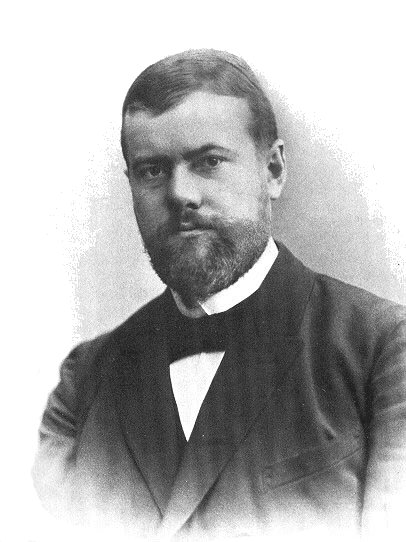 |
| Max Weber in 1894 (image from Wikimedia). |
Everybody in the Army!
Weber is very clear about what he considers as the origins of discipline:The discpline of the army gives birth to all discpline. (p. 261)After discpline has been established in the army, however, it can spread to other sectors:
… discipline has always affected the structure of the state, the economy, and possibly the family. (p. 257)For instance:
When infantry drill is perfected to the point of virtuosity (Sparta), the polis has an inevitably 'aristocratic' structure. When cities are based upon naval discpline, they have 'democratic' structures (Athens). […] The rule of the Roman participiate, of the Egyptian, Assyrian, and finally of all the modern European bureaucratic state organizations—all have their origin in discipline. (p. 257)OK, that was a bit fast on the trigger, cowboy, but I see what you're saying.
Discipline in the Factory
The principles of "scientific management" may also be explained in this way, according to Weber. In this respect, he has foreshadowed countless modern commentators, so I'll quote this at some length:No special proof is necessary to show that military discipline is the ideal model for the modern capitalist factory, as it was for the ancient plantation. In contrast to the plantation, organizational discipline in the factory is founded upon a completely rational basis. With the help of appropriate methods of measurement, the optimum profitability of the individual worker is calculated like that of any material means of production. On the basis of this calculation, the American system of 'scientific management' enjoys the greatest triuphs in the rational conditioning and training of work performances. The final consequences are drawn from the mechanization and discipline of the plant, and the psycho-physical apparatus of man is completely adjusted to the demands of the outer world, the tools, the machines—in short, to an individual 'function.' The individual is shorn of his natural rythm as determined by the structure of his organism; his psycho-physical apparatus is atuned to a new rythm through a methodical specialization of seperately functioning muscles, and an optimal economy of forces is established corresponding to the conditions of work. This whole process of rationalization, in the factory as elsewhere, and especially in the bureaucratic state machine, parallels the centralization of the material implements of organization in the discretionary power of the overlord. (p. 261–62)This translation is in fact quite off on a number of points, so let me just paste the German original in here for reference:
Daß dagegen die »militärische Disziplin« ganz ebenso wie für die antike Plantage auch das ideale Muster für den modernen kapitalistischen Werkstattbetrieb ist, bedarf nicht des besonderen Nachweises. Die Betriebsdisziplin ruht, im Gegensatz zur Plantage, hier völlig auf rationaler Basis, sie kalkuliert zunehmend, mit Hilfe geeigneter Messungsmethoden, den einzelnen Arbeiter ebenso, nach seinem Rentabilitätsoptimum, wie irgendein sachliches Produktionsmittel. Die höchsten Triumphe feiert die darauf aufgebaute rationale Abrichtung und Einübung von Arbeitsleistungen bekanntlich in dem amerikanischen System des »scientific management«, welches darin die letzten Konsequenzen der Mechanisierung und Disziplinierung des Betriebs zieht. Hier wird der psychophysische Apparat des Menschen völlig den Anforderungen, welche die Außenwelt, das Werkzeug, die Maschine, kurz die Funktion an ihn stellt, angepaßt, seines, durch den eigenen organischen Zusammenhang gegebenen, Rhythmus entkleidet und unter planvoller Zerlegung in Funktionen einzelner Muskeln und Schaffung einer optimalen Kräfteökonomie den Bedingungen der Arbeit entsprechend neu rhythmisiert. Dieser gesamte Rationalisierungsprozeß geht hier wie überall, vor allem auch im staatlichen bürokratischen Apparat, mit der Zentralisation der sachlichen Betriebsmittel in der Verfügungsgewalt des Herrn parallel. (pp. 686–87)I always get a sense that Weber wrote sentences like this when he was in the most gloomy mood, imagining a dismal future society of complete bureaucratization and control. As for Marx, Heidegger, and others, this sense of unease was ambiguous between a romantic protest against alienation and a more cynical mapping out of the mechanics of power.
Pragmatics at the Dentist
There is just one more thing I would like to quote, mostly out of a linguistic interest. This comes from the essay "The Protestant Sects and the Spirit of Capitalism."This essay was written after Weber's book on protestantism. Its main claim is that membership of esoteric church communities was used as an indication of one's creditworthiness in the USA of Weber's day. This made sense both because of the moral doctrines of the communities, and because membership was expensive.
In the beginning of the essay, Weber relates the following anecdote:
The matter became somewhat clearer from the story of a German-born nose-and-throat specialist, who had established himself in a large city on the Ohio River and who told me of the visit of his first patient. Upon the doctor's request, he lay down upon the couch to be examined with the nose reflector. The patient sat up nce and remarked with dignity and emphasis, 'Sir, I am a member of the –––––– Baptist Church in –––––– Street.' puzzled by about what the meaning this circumstance might for the diease of the nose and its treatment, the doctor discreetly inquired about the matter from an American colleague. The colleague smilingly informated him that the patient's statement of his church membership was merely to say: 'Don't worry about the fees.' (p. 304)The reason I found this such a nice example is that it shows how completely obscure pragmatic inferences sometimes are, and how wrong communication can go when the right common ground is absent.
No comments :
Post a Comment